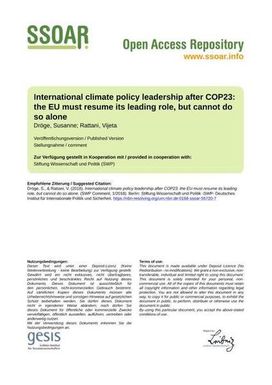Connect with GESIS - Leibniz Institute for the Social Sciences. Library Cologne
Contact this content partner to get more information about this item.
International climate policy leadership after COP23: the EU must resume its leading role, but cannot do so alone
- Description:
- The net outcome of the Bonn climate talks (23rd Conference of the Parties, COP23) in November was lukewarm at best. Many technical issues were brought forward and the political risks caused by the US announcement to pull out of the Paris Agreement were kept at bay. Yet, leadership to fill the void left by the US was lacking. Germany, who was co-hosting with the Fiji Islands, could not table ambitious solutions as in November 2017 it only had a caretaker government in place. The Fiji Presidency brought attention to adaptation, agriculture, finance and the loss and damage debates, but could not succeed to the full extent, mainly due to conflicts on finance. The performance by China was disappointing as it did not follow up on its ambitions to lead. With a view to 2018, the EU once again claimed a leadership role on the international climate agenda, though not unilaterally. During the Bonn UNFCCC negotiations, however, the EU disappointed many of its partners as it did not deliver as a constructive negotiator and bridge builder. Rather, it pushed for some of the technical issues. Given the urgency to forge a rulebook for the Paris Agreement implementation and in light of progressing climate change, the EU and its Member States need to demonstrate instrumental and directional leadership in the run-up to the next COP in Katowice, Poland in 2018. (author's abstract)
- Format:
- text
- Collections:
- GESIS - Leibniz Institute for the Social Sciences. Library Cologne
- Content partner:
- GESIS - Leibniz Institute for the Social Sciences. Library Cologne
- Availability:
- Not specified
-
Copyright status: All rights reservedFind out more about what you are able to do with this itemThis item is all rights reserved, with means you'll have to get permission from GESIS - Leibniz Institute for the Social Sciences. Library Cologne before using it. For more information, please see our use and reuse page.More informationGESIS - Leibniz Institute for the Social Sciences. Library Cologne has this to say about the rights status of this item:
http://rightsstatements.org/vocab/InC/1.0/
What can I do with this item?Non-infringing useNZ copyright law does not prevent every use of a copyright work, and this item may be hosted by an international institute or organisation. You should consider what you can and cannot do with a copyright work.No sharingYou may not copy and/or share this item with others without further permission. This includes posting it on your blog, using it in a presentation, or any other public use.No modifyingYou are not allowed to adapt or remix this item into any other works.No commercial useYou may not use this item commercially.
Welcome and warm Pasifik greetings
The information on this site has been gathered from our content partners.
The names, terms, and labels that we present on the site may contain images or voices of deceased persons and may also reflect the bias, norms, and perspective of the period of time in which they were created. We accept that these may not be appropriate today.
If you have any concerns or questions about an item, please contact us.



